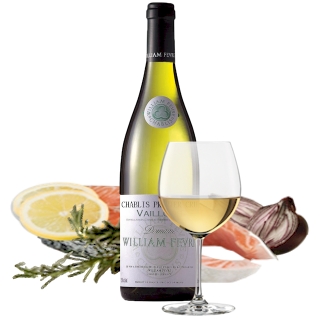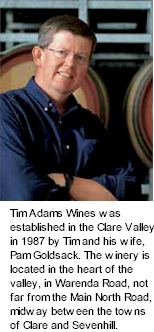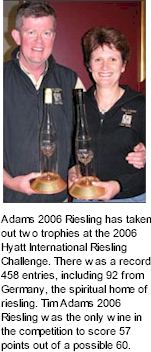


Tim Adams began work in the wine industry as a cellarhand at the Stanley Wine Company in February 1975. He progressed to the position of laboratory assistant in 1976, and with encouragement and financial assistance from Mr Mick Knappstein, the then General Manager, Tim enrolled in the Bachelor of Applied Science (Wine Science) at Charles Sturt University in Wagga Wagga, NSW, and began studying by correspondence.

Tim graduated in 1981, by which time he had been appointed assistant winemaker. The following year Tim was appointed winemaker, with responsibility for day-to-day operation of the winery, which then employed as many as 60 people. The first inclination to leave came in 1984, when local cooper Bill Wray suggested a partnership of the two families to make wine and small oak casks. The first wines under the Adams & Wray label were released in September 1986, by which time Tim had left the Stanley Wine Company. Mr Mick continued to offer encouragement and to consult at tastings, embracing Tim as his last apprentice.
In May 1987 the Adams & Wray partnership was dissolved, Pam and Tim took full control of the renamed Tim Adams Wines. In late 1987 they purchased the existing winery site and opened the cellar door in January 1988. The first crushing of first grapes occurred on-site several months later.
Tim Adams has come a long way since 1985, when just 10 tonnes of grapes were vinified. The winery now crushes about a thousand tonnes annually — about 850 tonnes for the Tim Adams Wines label, the rest under contract to other Clare labels. The fruit is sourced from 13 local growers as well as from two leased vineyards and two estate vineyards. Riesling, semillon, viognier, pinot gris, malbec, tempranillo and shiraz is grown at the Sheoak Vineyard. The estate's Ladera Vineyard, established in 2004, is planted to pinot gris and tempranillo.

Tim Adams focus is on making wines exclusively from Clare Valley grapes selected for their authentic varietal and regional characters. Tim Adams regards it as the greates privilege to have regular, long-term access to the unique Aberfeldy Vineyard which so succinctly encapsulates and concentrates everything that’s good about Clare Valley shiraz. Aberfeldy was established in 1904 by the Birks family, of Wendouree fame, about five kilometres south-east of Clare township on a site nestled at the bottom of the easternmost hills of the Clare Valley. Many of the shiraz vines planted by A.P. Birks and his brother William are still bearing fruit and it’s those gnarled centurions that give Aberfeldy Shiraz it's enormous depth and strength of flavour.
The Aberfeldy Vineyard, which was expanded by another acre of shiraz in the late ’80s and early ’90s, is text-book red-grape terroir. At more than 400 metres, it’s quite elevated and the fruit is inevitably among the latest to ripen, which is what gives the wines real elegance as well as power. The soil is classic — red loam over limestone subsoil — though it varies quite markedly in depth. There are pockets in the bottom of the valley where topsoil has accumulated due to run-off from the hills and is so deep that the vines have had to be retrellised and retrained to keep them sufficiently above ground.
In the mid-1980s there wasn’t much demand for shiraz grapes. Tim approached the owner of Aberfeldy Claude Nicholas, who responded by waving the Bible above his head and declaring ‘God has sent you to buy our fruit’. When the current owners bought the property in 1987, all parties agreed that the vineyard should provide grapes exclusively to Tim Adams, and the security of the arrangement gave rise to Aberfeldy becoming the estate flagship wine.
